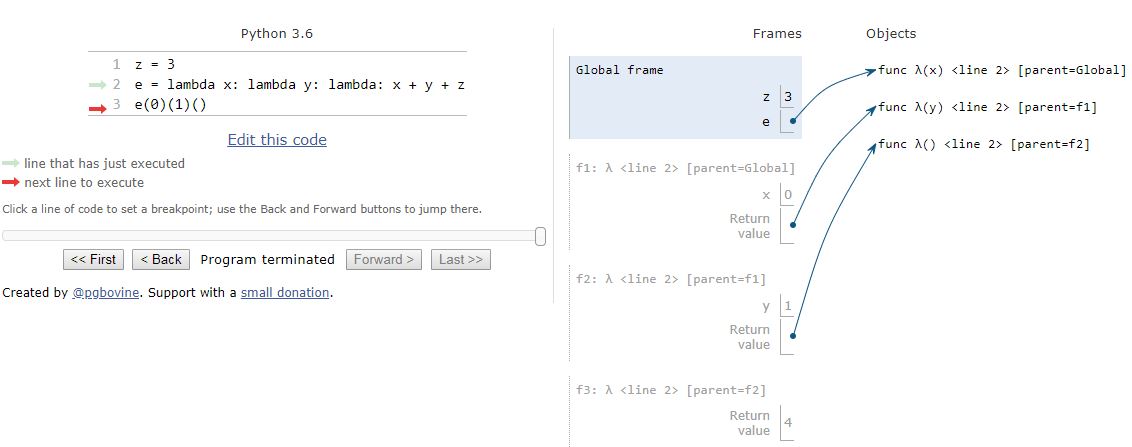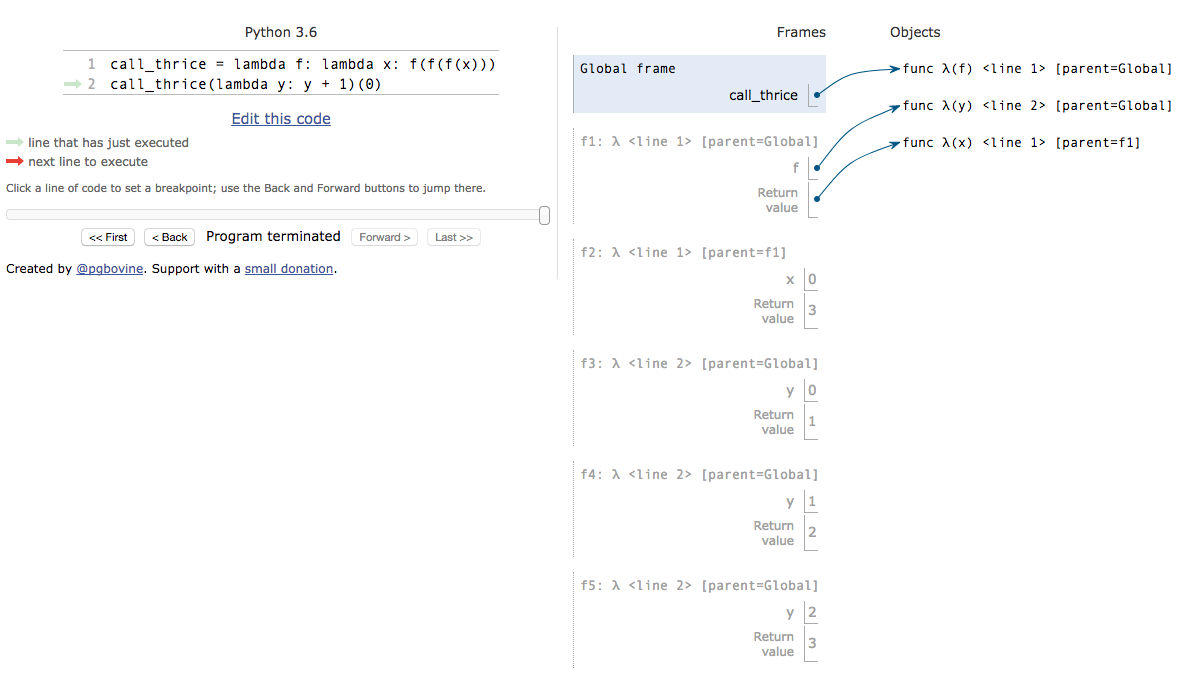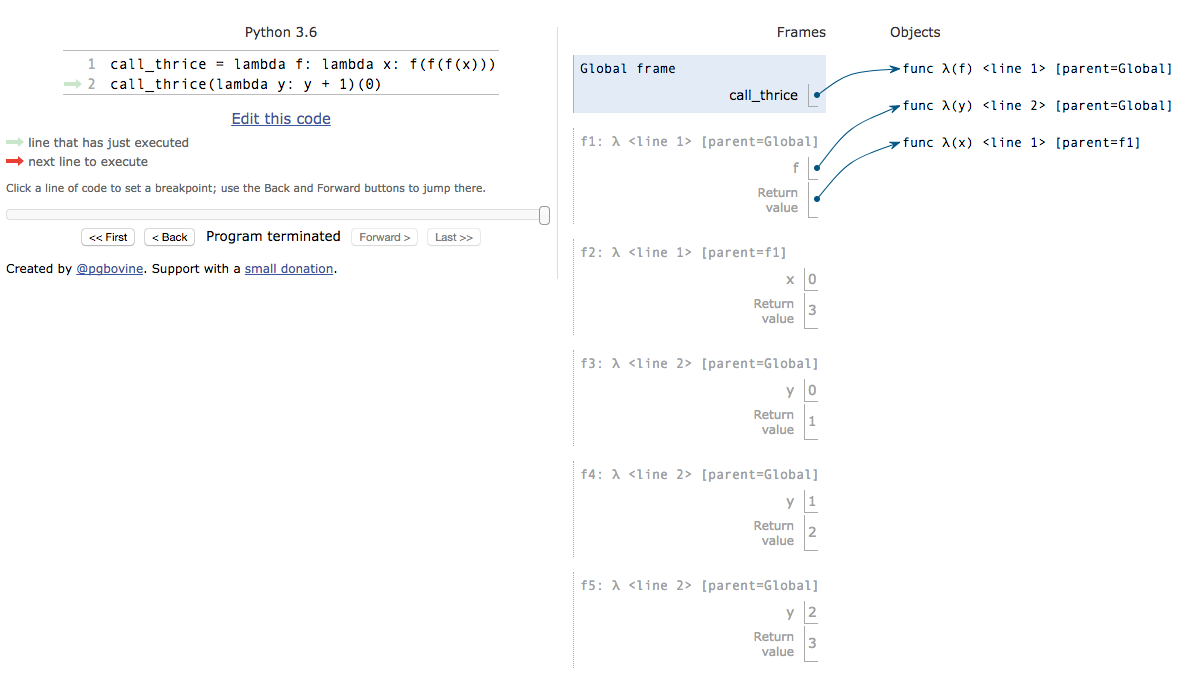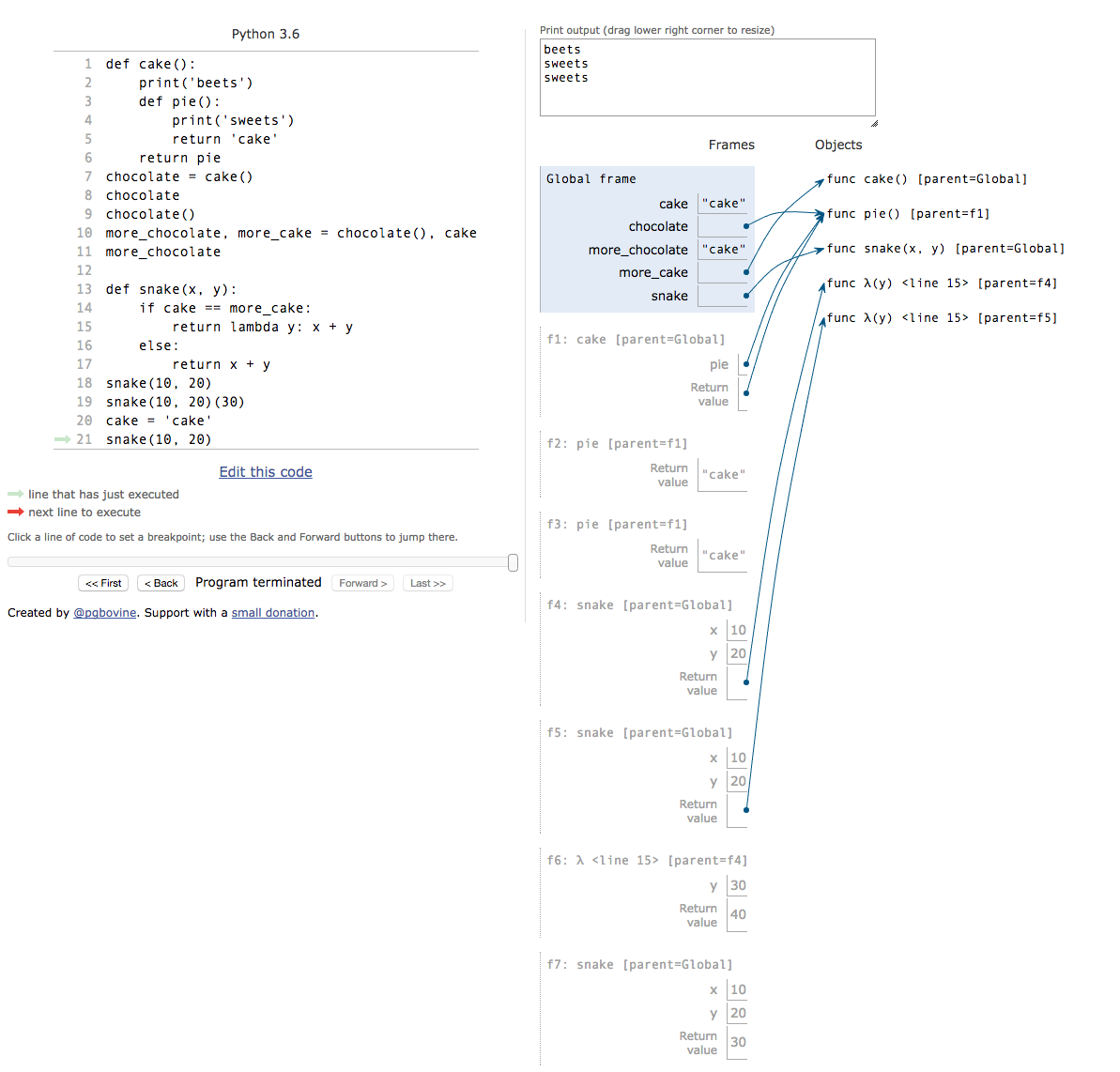Lambda Expressions and Higher-Order Functions 学习笔记和习题解答
CS61A Spring 笔记
参考: https://inst.eecs.berkeley.edu/~cs61a/sp18/lab/lab02/
Lambda Expressions
Lambda Expressions is one-line functions that specify two things: the parameters and the return expression.
lambda <parameters>: <return expression>Differences between lambda and def :
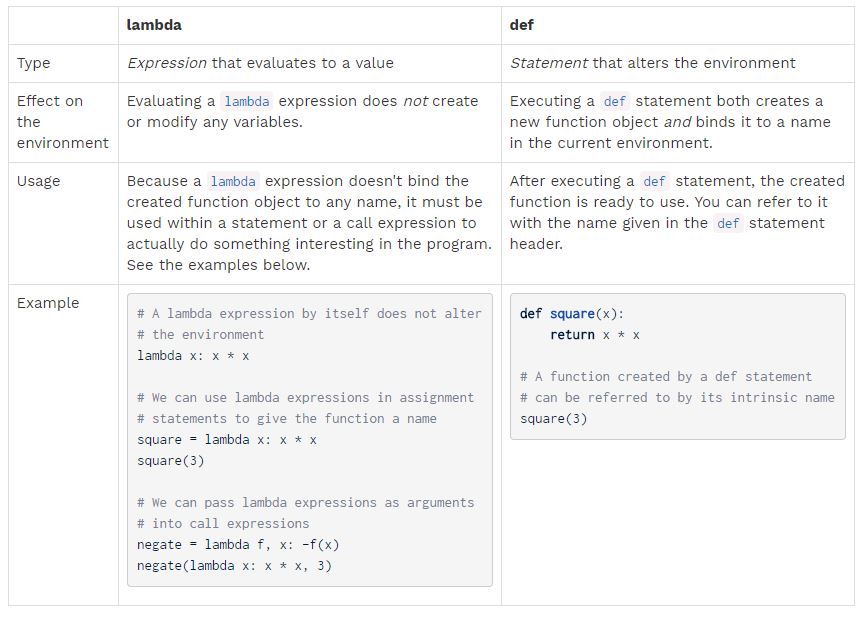
Higher Order Functions
A higher order function is a function that manipulates other functions by taking in functions as arguments, returning a function, or both.
Functions as arguments
using a def statement to create function:
def square(x):
return x * xThe above statement created a function object with the intrinsic name square as well as binded it to the name square in the current environment.
A function that takes in another arguments:
def scale(f, x, k):
""" Returns the result of f(x) scaled by k. """
return k * f(x)call scale on square and some other arguments:
>>> scale(square, 3, 2) # Double square(3)
18
>>> scale(square, 2, 5) # 5 times 2 squared
20pass lambda functions into call expressions:
>>> scale(lambda x: x + 10, 5, 2)
30Functions that return functions
Because functions are values, you can also return them in other functions!
def multiply_by(m):
def multiply(n):
return n * m
return multiply>>> multiply_by(3)
<function multiply_by.<locals>.multiply at ...>
>>> multiply(4)
Traceback (most recent call last):
File "<stdin>", line 1, in <module>
NameError: name 'multiply' is not definedWe cannot directly call the inner function, two ways to call it:
>>> times_three = multiply_by(3) # Assign the result of the call expression to a name
>>> times_three(5) # Call the inner function with its new name
15
>>> multiply_by(3)(10) # Chain together two call expressions
30Here’s what multiply_by would look like if we wrote it with a lambda expression:
def multiply_by(m):
return lambda n: n * mEnvironment Diagrams
Environment diagrams are one of the best learning tools for understanding lambda expressions and higher order functions because you’re able to keep track of all the different names, function objects, and arguments to functions.
Use Python tutor to draw Environment Diagrams.
for example:
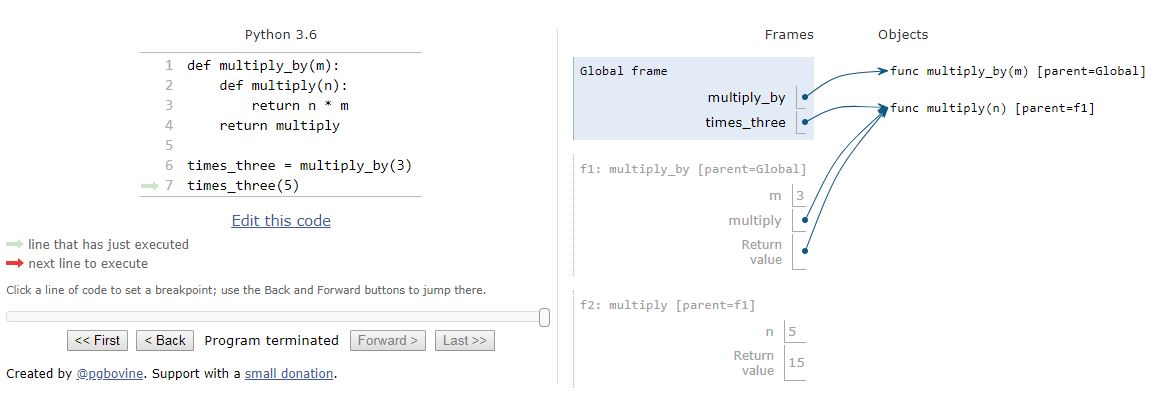
Questions:
What Would Python Display?
Q1: WWPD: Lambda the Free
(1)
>>> lambda x: x # A lambda expression with one parameter x
______
>>> a = lambda x: x # Assigning the lambda function to the name a
>>> a(5)
______
>>> (lambda: 3)() # Using a lambda expression as an operator in a call exp.
______
>>> b = lambda x: lambda: x # Lambdas can return other lambdas!
>>> c = b(88)
>>> c
______
>>> c()
______
>>> d = lambda f: f(4) # They can have functions as arguments as well.
>>> def square(x):
... return x * x
>>> d(square)
______>>> lambda x: x # A lambda expression with one parameter x
<function <lambda> at ...>
>>> a = lambda x: x # Assigning the lambda function to the name a
>>> a(5)
5
>>> (lambda: 3)() # Using a lambda expression as an operator in a call exp.
3
##
>>> b = lambda x: lambda: x # Lambdas can return other lambdas!
>>> c = b(88)
>>> c
<function <lambda> at ...
>>> c()
88
>>> d = lambda f: f(4) # They can have functions as arguments as well.
>>> def square(x):
... return x * x
>>> d(square)
16(2)
>>> z = 3
>>> e = lambda x: lambda y: lambda: x + y + z
>>> e(0)(1)()
______
>>> f = lambda z: x + z
>>> f(3)
______>>> z = 3
>>> e = lambda x: lambda y: lambda: x + y + z
>>> e(0)(1)()
4
>>> f = lambda z: x + z
>>> f(3)
NameError: name 'x' is not defined(3)
>>> higher_order_lambda = lambda f: lambda x: f(x)
>>> g = lambda x: x * x
>>> higher_order_lambda(2)(g) # Which argument belongs to which function call?
______
>>> higher_order_lambda(g)(2)
______
>>> call_thrice = lambda f: lambda x: f(f(f(x)))
>>> call_thrice(lambda y: y + 1)(0)
______
>>> print_lambda = lambda z: print(z)
# When is the return expression of a lambda expression executed?
>>> print_lambda
______
>>> one_thousand = print_lambda(1000)
______
>>> one_thousand
______>>> higher_order_lambda = lambda f: lambda x: f(x)
>>> g = lambda x: x * x
>>> higher_order_lambda(2)(g) # Which argument belongs to which function call?
Error
>>> higher_order_lambda(g)(2)
4
>>> call_thrice = lambda f: lambda x: f(f(f(x)))
>>> call_thrice(lambda y: y + 1)(0)
3
>>> print_lambda = lambda z: print(z) # When is the return expression of a lambda expression executed?
>>> print_lambda
Function
>>> one_thousand = print_lambda(1000)
1000
>>> one_thousand
# print_lambda returned None, so nothing gets displayedQ2: WWPD: Higher Order Functions
(1)
>>> def even(f):
... def odd(x):
... if x < 0:
... return f(-x)
... return f(x)
... return odd
>>> steven = lambda x: x
>>> stewart = even(steven)
>>> stewart
______
>>> stewart(61)
______
>>> stewart(-4)
______>>> def even(f):
... def odd(x):
... if x < 0:
... return f(-x)
... return f(x)
... return odd
>>> steven = lambda x: x
>>> stewart = even(steven)
>>> stewart
<function ...>
>>> stewart(61)
61
>>> stewart(-4)
4(2)
>>> def cake():
... print('beets')
... def pie():
... print('sweets')
... return 'cake'
... return pie
>>> chocolate = cake()
______
>>> chocolate
______
>>> chocolate()
______
>>> more_chocolate, more_cake = chocolate(), cake
______
>>> more_chocolate
______
>>> def snake(x, y):
... if cake == more_cake:
... return lambda y: x + y
... else:
... return x + y
>>> snake(10, 20)
______
>>> snake(10, 20)(30)
______
>>> cake = 'cake'
>>> snake(10, 20)
______>>> def cake():
... print('beets')
... def pie():
... print('sweets')
... return 'cake'
... return pie
>>> chocolate = cake()
beets
>>> chocolate
Function
>>> chocolate()
sweets
'cake'
>>> more_chocolate, more_cake = chocolate(), cake
sweets
>>> more_chocolate
'cake'
>>> def snake(x, y):
... if cake == more_cake:
... return lambda y: x + y
... else:
... return x + y
>>> snake(10, 20)
Function
>>> snake(10, 20)(30)
40
>>> cake = 'cake'
>>> snake(10, 20)
30



